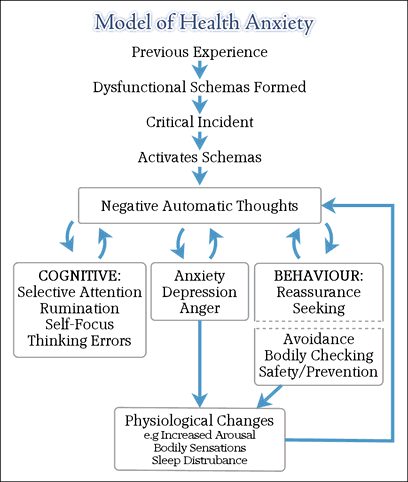
Tel: 0800 078 7712
Home | Common Problems | Therapies | Format Fees | Common Myths | Consultancy | Contact | Links
Expert; Individual; Formulation driven CBT
Copyright © 2022, A.S.T. Consultancy.
Health Anxiety
Health Anxiety is characterised by the belief that one has, or fears developing, a serious disease based on the misinterpretations of one’s bodily symptoms.
From a Cognitive Behavioural perspective Health Anxiety is similar in concept to that of Panic Disorder, the major difference being the immediacy of the threat to one’s health e.g. if one judges that the heart attack is happening now then one is more likely to panic than to worry about it happening at some point in the future.
The beliefs regarding the state of health are not borne out by a corresponding medical diagnosis which supports these fears, and that these beliefs are not “delusional” in nature as one can accept that the extent of the (feared) illness may be being exaggerated. Typically the health anxious person will generally focus on symptoms which one believes confirm beliefs about the state of one’s health, e.g. a cough, a blemish or lump may be a sign of cancer or headaches may be a sign of impending stroke.
Reassurance seeking is extensive and may amount in certain extremes to “Doctor Shopping”,
other behaviours include self-
Formulation
Cognitive & Behavioural Psychotherapists collaborate with the patient to identify & assess all maintaining factors; including thoughts, behaviours, emotions and physical symptoms associated with the problem and develop a working formulation which will be utilised to guide the course of therapy.
Treatment
A number of techniques will be employed to test predictions and beliefs which may include behavioural strategies such as exposure and cognitive interventions aimed at identifying and challenging unhelpful thoughts and beliefs, possible thinking errors and misinterpretations. These may then be challenged through a combination of verbal reattribution, Socratic questioning and behavioural experiments.
Final stages of the therapeutic interventions are aimed at relapse prevention strategies.

A cognitive model of Health Anxiety, Salkovskis 1989
